Top 20 SEO Tools to Enhance Your Website’s Performance
Introduction
The correct tools can significantly impact your digital marketing efforts in the always-changing realm of search engine optimization (SEO). Website owners, marketers, and SEO specialists can all benefit from SEO tools to improve their websites, analyze performance data, and gain a competitive edge. This article will discuss the top 20 SEO tools that have become well-known for their extensive features, precision, and capacity to produce results. These tools can turbocharge your SEO approach and aid in the accomplishment of your digital marketing objectives, whether you’re doing technical audits, keyword research, performing technical research, or analyzing backlinks.
What is an SEO tool?
SEO tools are software or online applications specifically designed to assist website owners, marketers, and SEO professionals in optimizing their websites for better search engine rankings and visibility. These tools provide a range of features and functionalities that help with various aspects of search engine optimization. These tools provide insights, analysis, and recommendations to optimize various aspects of a website, making it more search engine-friendly. SEO tools cover a wide range of functionalities, including keyword research, backlink analysis, site auditing, and performance tracking. They play a crucial role in enhancing a website’s visibility, driving organic traffic, and ultimately improving its overall performance in search engine results. In simpler terms, these tools act as your digital allies, guiding you to make informed decisions that positively impact your website’s search engine ranking.
SEO tools can perform tasks such as:
- Keyword Research
- On-Page Optimization
- Site Audits
- Backlink Analysis
- Competitor Analysis
- Reporting and Analytics
By utilizing SEO tools, website owners and SEO professionals can streamline their optimization processes, gather valuable insights, and improve their website’s visibility in search engine results. These tools play a crucial role in enhancing search engine rankings, driving organic traffic, and achieving sustainable growth online.
Why do we need to use SEO tools? What are the benefits of using SEO tools?
In today’s digital landscape, where competition for online visibility is fierce, utilizing SEO tools has become essential for website owners, marketers, and SEO professionals. Here are some compelling reasons why we need to use SEO tools:
- Data-driven Insights:
SEO tools provide valuable data and insights that help understand user behavior, keyword trends, website performance, and competitor strategies. This data-driven approach enables informed decision-making and allows for the optimization of SEO efforts based on real-time information. - Time and Effort Efficiency:
SEO tools automate and streamline various SEO tasks, saving time and effort. These tools can quickly perform tasks like keyword research, site audits, backlink analysis, and reporting that would otherwise be time-consuming and tedious if done manually. This efficiency allows SEO professionals to focus on strategy development and implementation. - Competitive Advantage:
SEO tools provide a competitive edge by enabling users to analyze and understand their competitors’ strategies. By identifying competitor keywords, backlinks, and content strategies, one can devise effective countermeasures and stay ahead in search engine rankings. - Comprehensive Website Analysis:
SEO tools perform comprehensive website audits, highlighting technical issues, broken links, duplicate content, and other SEO-related problems. By addressing these issues, websites can improve user experience, search engine crawlability, and overall website performance. - Keyword Optimization:
SEO tools assist in finding relevant keywords, search volumes, and competition levels. This helps in optimizing website content to align with user intent, rank higher in search engine results, and attract targeted organic traffic. - Tracking and Reporting:
SEO tools provide monitoring and reporting features, tracking important metrics like keyword rankings, organic traffic, and backlink growth. These reports offer valuable insights into SEO progress, allowing for performance evaluation and adjustment of strategies accordingly. - ROI and Conversion Tracking:
By integrating SEO tools with analytics platforms, it becomes possible to track the impact of SEO efforts on conversions, revenue, and return on investment (ROI). This data helps justify SEO investments and allocate resources effectively.
In summary, SEO tools are indispensable in today’s digital landscape. They provide invaluable insights, save time and effort, enable competitive analysis, optimize website performance, and track progress. By leveraging these tools, businesses can enhance their online visibility, attract targeted traffic, and achieve long-term success in search engine rankings.
Here is the list of the Top 20 Best SEO Tools:
- Google Search Console:
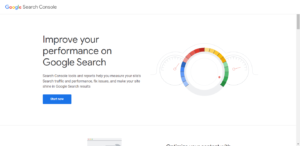
Google Search Console is a free tool provided by Google that allows you to monitor and analyze your website’s performance in search results. It provides valuable insights into search traffic, indexation status, keyword rankings, and mobile usability. By leveraging this tool, you can identify and fix technical issues, optimize your website for search engines, and improve your overall visibility on Google. - SEMrush:

SEMrush is an all-in-one SEO toolkit that offers a comprehensive set of features. It provides in-depth keyword research, competitor analysis, backlink analysis, and rank tracking. Additionally, SEMrush offers content optimization recommendations, on-page SEO audits, and social media monitoring. Its user-friendly interface and robust reporting capabilities make it a top choice for SEO professionals. - Moz Pro:
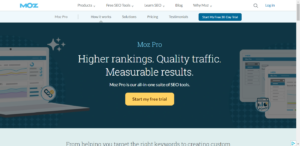
Moz Pro is a widely trusted SEO tool that offers a range of features to enhance your website’s visibility. It provides comprehensive keyword research, on-page optimization recommendations, rank tracking, and backlink analysis. Moz Pro’s Link Explorer allows you to analyze your website’s backlink profile, identify link-building opportunities, and monitor your link health. - Ahrefs:

Ahrefs is a powerful SEO tool known for its extensive backlink analysis capabilities. It allows you to explore competitors’ backlink profiles, track your own backlinks, and identify new link-building opportunities. Ahrefs also offers robust keyword research, rank tracking, content analysis, and site auditing features to help you optimize your website and improve your organic rankings. - SEMrush Content Marketing Toolkit:

SEMrush’s Content Marketing Toolkit is designed to enhance your content strategy. It provides topic research, content optimization recommendations, content performance analysis, and content distribution insights. With this toolkit, you can discover relevant topics, optimize your content for target keywords, measure its effectiveness, and identify channels for content promotion. - Screaming Frog:
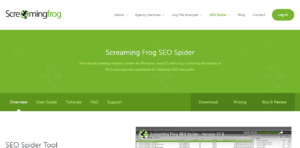
Screaming Frog is a powerful website crawling tool that helps you identify technical SEO issues. It crawls your website, analyzes key on-page elements, and provides detailed reports on issues such as broken links, duplicate content, and missing meta tags. This tool is invaluable for ensuring that your website is properly optimized for search engines and delivering a seamless user experience. - Google Analytics:
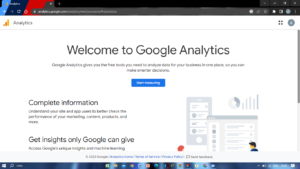
Google Analytics is a must-have tool for understanding user behaviour on your website. It provides comprehensive data on website traffic, user engagement, conversions, and more. By analyzing this data, you can gain insights into your audience, identify high-performing pages, and optimize your website for better user experience and conversions.
- Yoast SEO:

Yoast SEO is a popular WordPress plugin that helps optimize your website’s on-page elements. It provides real-time content analysis, readability checks, XML sitemap generation, and social media integration. Yoast SEO ensures that your content is well-optimized for search engines and provides recommendations to improve your website’s SEO performance. - Google Keyword Planner:

Google Keyword Planner, part of Google Ads, is a free tool that aids in keyword research. It provides valuable insights into keyword search volumes, competition levels, and related keyword suggestions. By utilizing this tool, you can discover relevant keywords for your content, identify long-tail keyword opportunities, and align your content with user search intent. - Majestic:

Majestic is a comprehensive backlink analysis tool that helps you understand and evaluate the quality of your backlinks. It provides detailed information about link profiles, anchor texts, referring domains, and more. Majestic’s Trust Flow and Citation Flow metrics help you assess the authority and relevance of your website and make informed decisions about link-building strategies. - SpyFu:
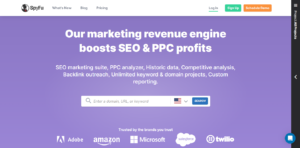
SpyFu is a competitive research tool that allows you to gain insights into your competitors’ online marketing strategies. It provides data on competitor keywords, organic search rankings, paid search campaigns, and ad copy. With SpyFu, you can uncover profitable keywords, analyze competitor ad campaigns, and fine-tune your own SEO and advertising strategies to stay ahead in the market. - Serpstat:

Serpstat is a comprehensive SEO platform that offers a wide range of features. It provides keyword research, rank tracking, backlink analysis, site audits, and competitor analysis. Serpstat also offers content optimization recommendations, keyword clustering, and search analytics to help you refine your SEO strategy and boost your website’s performance. - Raven Tools:
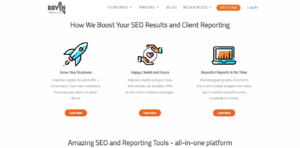
Raven Tools is an all-in-one SEO platform that integrates various SEO functionalities. It offers features like website auditing, backlink analysis, rank tracking, competitor research, and social media management. With its comprehensive reporting and analysis capabilities, Raven Tools enables you to monitor your website’s SEO performance and make data-driven decisions to optimize your online presence. - Moz Local:
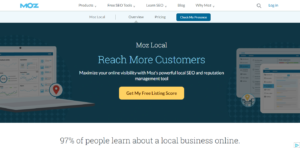
Moz Local is a tool specifically designed for local SEO. It helps businesses manage their online presence across multiple directories and platforms. With Moz Local, you can ensure that your business information is accurate and consistent, monitor customer reviews, and track your local search rankings. It simplifies the process of managing local SEO efforts and helps businesses attract more customers from their target locations. - SEOquake:
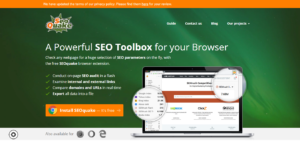
SEOquake is a browser extension that provides instant SEO metrics for any webpage. It displays data such as domain authority, page authority, keyword density, and social media metrics. SEOquake allows you to quickly assess the SEO strength of your competitors’ websites, analyze search results, and gather valuable insights while browsing the web. - BuzzSumo:

BuzzSumo is a content marketing tool that helps you discover popular content and analyze its performance. It allows you to find trending topics, identify influential content creators, and monitor social media engagement. By understanding what content resonates with your target audience, you can create high-quality, shareable content that drives traffic, engagement, and backlinks. - CognitiveSEO:

CognitiveSEO is an advanced SEO tool that offers comprehensive backlink analysis, rank tracking, content optimization, and site auditing features. It provides in-depth insights into your website’s backlink profile, identifies toxic links, and helps you build high-quality links. CognitiveSEO also offers keyword research, competitor analysis, and content performance tracking to enhance your SEO strategy and improve your website’s visibility. - MozBar:
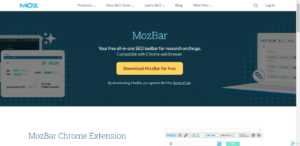
MozBar is a browser extension that provides on-page SEO analysis and metrics while you browse websites. It displays valuable data like page authority, domain authority, and keyword analysis directly in your browser. MozBar allows you to quickly assess the SEO strength of webpages, identify optimization opportunities, and gather competitive insights. - Linkody:
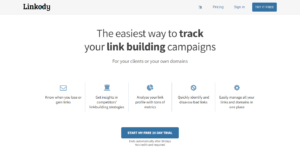
Linkody is a backlink monitoring and analysis tool that helps you track and manage your backlink profile. It notifies you of new and lost backlinks, provides metrics on link quality, and helps you monitor your link-building efforts. With Linkody, you can identify opportunities to build new links, disavow harmful links, and track the impact of your link-building campaigns. - Ubersuggest:
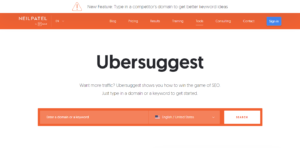
Ubersuggest is a versatile SEO tool that offers keyword research, competitor analysis, content ideas, and rank-tracking features. It provides keyword suggestions, search volume data, and content recommendations to optimize your website for organic search. Ubersuggest also allows you to analyze competitors’ top-performing pages, backlinks, and advertising strategies to refine your own SEO and content strategies.
FAQ’s
Do free SEO tools exist?
Yes, there are several free SEO tools available that provide valuable features and insights. Tools like Google Search Console, Google Analytics, and Google Keyword Planner offer essential functionalities for keyword research, website analysis, and performance tracking. Additionally, tools like Ubersuggest, SEOquake, and MozBar offer free versions with limited features. These free SEO tools are a great starting point for beginners and small businesses looking to optimize their websites without incurring additional costs.
Which is the simplest SEO tool?
One of the simplest SEO tools available is Google Search Console. It is a free tool provided by Google that offers valuable insights into your website’s performance in search results. With Google Search Console, you can monitor your website’s indexing status, track keyword rankings, analyze search traffic, identify technical issues, and submit sitemaps. Its user-friendly interface and straightforward features make it an excellent choice for beginners and website owners who want to optimize their site for search engines.
Why use an SEO tool?
Using an SEO tool is crucial for maximizing your website’s visibility and achieving online success. These tools provide valuable data and insights, automate time-consuming tasks, analyze competitors, optimize website performance, and track progress. By leveraging an SEO tool, you can make informed decisions, implement effective strategies, and stay ahead of the competition, ultimately driving more organic traffic and achieving higher search engine rankings.
Do SEO tools save time?
Yes, SEO tools are designed to save time by automating various SEO tasks. These tools can quickly perform tasks such as keyword research, site audits, backlink analysis, and rank tracking that would otherwise be time-consuming if done manually. By utilizing SEO tools, professionals can streamline their workflows, focus on strategy development, and allocate more time to other essential aspects of their digital marketing efforts.
Wrap UP
These top 20 SEO tools offer a wide range of features to enhance your website’s visibility, optimize your content, analyze data, and stay ahead of the competition. Whether you are conducting keyword research, tracking rankings, performing technical audits, or analyzing backlinks, these tools provide valuable insights and actionable recommendations to improve your SEO strategy. By leveraging these tools effectively, you can drive organic traffic, boost your website’s performance, and achieve sustainable growth in the ever-evolving world of SEO.







